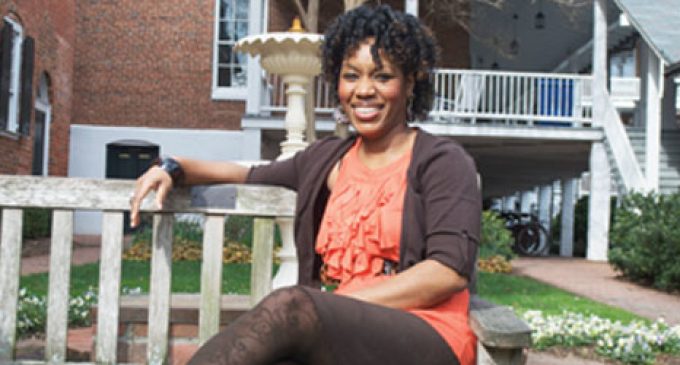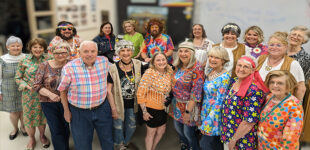Ph.D. student gathers experiences of black women from around the world

Krishauna Hines-Gaither is exploring the vastness of the African Diaspora right here in her hometown.
The University of North Carolina at Greensboro doctoral student has spent nearly eight years studying the growing number of local residents who have black skin but are not African American. In her studies, she has discovered blacks who hail from all over the globe, proof that the slave trade was truly a global enterprise.
Hines-Gaither, who teaches Spanish at Salem College, first became interested in the subject after visiting Mexico in 1998.
“I went to Acapulco, which is on the coast,” she related, noting that the descendants of African slaves are most often found in coastal areas of Latin America. “…I saw all of these black people. I had no idea they were there. I was totally shocked.”
Intrigued by the notion that she and her Spanish speaking counterparts had some cultural heritage in common, Hines-Gaither began talking to the people she encountered in hopes of learning more about Afro-Mexican history.
“When I started asking them questions about their own history or heritage, they didn’t know either,” she reported. “They could look at me and recognize the similarities but they had no idea of their history. It’s a history of silence and denial.”
Despite considerable digging, Hines-Gaither said little information was available about Afro-Latino culture, even though Latin America was once home to five times as many slaves as the United States, according to her research.
Hines-Gaither, who has both a master’s degree (from Wake Forest University) and a bachelor’s degree (from Salem) in Spanish Education, began to tackle the topic in earnest when she enrolled in the doctoral program. In 2005, she acquired a 10-day work visa to travel to Cuba to collect data about Afro-Cubans. The research she gathered will help her with her dissertation, which focuses on black Latina immigrants in North Carolina.
Colon, Panama native Avis Williams-Smith is among the Afro-Latina subjects Hines-Gaither has interviewed thus far. Williams-Smith, a mother of three, said she was happy to be involved with the project.
“I think the project is awesome to present a different view of the Hispanic woman. It’s definitely different for us. It’s much more difficult from my perspective because I kind of feel like I don’t fit into any one mold,” said Williams-Smith, a medical interpretation student at GTCC. “I’m a black woman – that’s what everyone sees – but I can’t change my culture, I’m a Hispanic woman as well. I thought it was awesome that she addressed that. We were kind of invisible. Black Hispanic females are never discussed or talked about or anything.”
Williams-Smith said she was aware of her familial heritage, which can be traced back to Jamaica, but she never thought of herself as a black woman before moving to America to pursue her master’s degree in linguistics and literature at Penn State University.
“I never thought of my race, I just thought of myself as a woman,” she said, noting that Panamanians differentiate themselves based on socio-economics, not ethnicity.
In researching for her dissertation, Hines-Gaither, who will complete her coursework in cultural studies this spring, discovered that the black international presence in Winston-Salem reaches far beyond Latin America.
Quebec (Canada) native Achlai Wallace is one of six international subjects Hines-Gaither has interviewed during her research process. Wallace, a InterVarsity Christian Fellowship campus minister for five area colleges, hails from a thriving population of Haitians that reside in the frigid French-speaking province. Having done her own research on black women in her native Canada, Wallace said Hines-Gaither’s work piqued her interest right away. The two became close friends and even travel together, presenting Hines-Gaither’s research.
“I also love culture and I love that Krishauna is seeing black people in other places because I think that’s a huge thingto educate people. I know firsthand that that’s needed because of my interaction with students,” said Wallace, who moved to the U.S. nearly six years ago to be with her American husband.
Though varied, Hines-Gaither said many of the international women’s experiences in the United States dovetail with her own experiences as an African American. While her subjects are proud of their nationality and want to be recognized as citizens of their birthplace, they also identify strongly with the African American community as well, she said.
Twenty-three year-old Ama Frimpong, a native of Accra, Ghana, can relate to both.
“I have always considered, and will always consider, myself an African living in America, just because of the pride and love that I have for my country and my continent. When I think of home, I think of Ghana,” Frimpong stated. “…That being said, I see no distinction when it comes to fighting for equality or other social justice issues that affect us all alike. Before we are any particular ethnicity or race, we are first human.”
As a Spanish major at Salem, Frimpong, who is now a Wake Forest Law student, was enrolled in several of Hines-Gaither’s courses and later contributed her voice to Hines-Gaither’s growing repertoire of black international women’s accounts of life in North Carolina.
Hines-Gaither, whose first book, a memoir about her work and studies, is awaiting publication, said she intends to continue her exploration of black international women.
“I would hope that this is the first of many books,” she said of her dissertation. “I would love to continue documenting the stories of black women of the diaspora. I think there are stories that we don’t hear of a lot or we make assumptions about them. I would love to hear about their experiences from their own voices.”
To read more about Hines-Gaither’s research and travels, go to www.weboaal.com/travelogue2.htm.


















